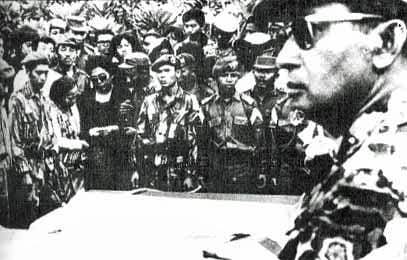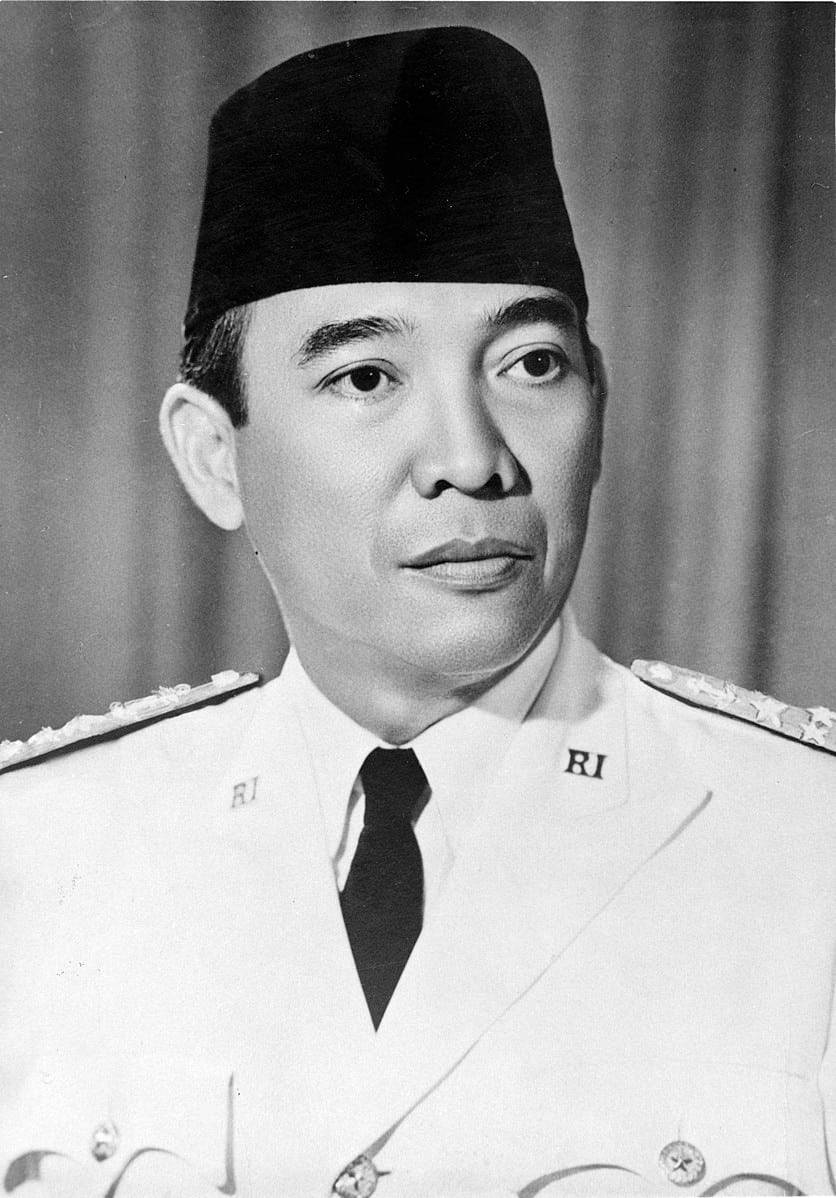The 1960s in Indonesia proved to be a tumultuous period that saw territorial tensions, political strife, and the genocide of communist supporters and others between 1965 and 1966. This anger came to a boiling point when the 30 September Movement, also known as Gerakan Satu Oktober, attempted a coup that resulted in the assasination of six army generals and forced president Sukarno into protective custody. In the end, the attempted coup failed, and the Communist Party of Indonesia took the blame. This idea was pushed by the army, especially military leader Suharto, which then resulted in anti-communist purges. Such purges led to an estimated five hundred thousand to one million deaths.
During this time the U.S. was not particularly liked by Indonesia. For instance, in 1964, President Sukarno made a speech publicly denouncing the United States. Following the denunciation of America, an anti-American campaign ensued in which companies were threatened, movies were banned, the flag was burned, and buildings were attacked. Moreover, evidence suggesting that the U.S. supported these purges, received updates on the executions, and offered to help suppress media coverage of the events further contributed to the poor state of relations between the two countries.
All these factors made it difficult to conduct business and normal operations in Indonesia. This is where Robert Walkinshaw’s role came in: he started the process of returning bilateral relations to an amicable place. Walkinshaw had begun his assignment at the embassy scarcely one month before it was firebombed, at the peak of the turmoil. Hence, there was very little interaction between Indonesians and official U.S. government representatives. That was the case until Walkinshaw took the initiative to reach out to the host country community. Through Walkinshaw’s efforts, he was able to form a relationship with the Indonesian trade minister that opened the door for others in the embassy. Additionally, he introduced Indonesian labor leaders to trade ministers. In this “Moment” we see that Robert Walkinshaw proved integral to not only reviving the American-Indonesian trade relationship, but also the overall diplomatic relationship.
Robert Walkinshaw was interviewed by Charles Stuart Kennedy on March 2, 1993
Read Robert Walkinshaw’s full interview HERE.
Read more about the U.S.’s role in the 1965-1966 purges HERE.
To read more about Indonesia in the 1960s, look HERE.
Drafted by Nathaniel Schochet
ADST relies on the generous support of our members and readers like you. Please support our efforts to continue capturing, preserving, and sharing the experiences of America’s diplomats.
Excerpts:
“This would have been about ’66?”
Conditions in Indonesia:
WALKINSHAW: ’66. As a matter of fact I was only there about a month when they stormed the embassy. You remember they fire bombed the embassy. Here I am; I am coming into a country. Leitman is the DCM and Marshall Green is the Ambassador . . . .
But I am coming into an embassy and a country that’s on fire. The American community is hated; they’re spitting at them. As a matter of fact, my wife went to the market and they spat on her. The labor guys were hiding someplace, so I said to myself: Eirich. Paul Eirich. He left me a list of people. So I pick out the names and the unions and I get to the embassy and get a car. Let me tell you about my first experience in trying to establish a contact. I get the driver and tell him where I want to go. Immediately he is shuddering. I said, “What’s wrong?” “No, nothing.”
“Then I noticed outside, there must have been 23 about 25 soldiers with rifles”
Experiencing the Other Side:
WALKINSHAW: Sukarno and Subrandio were still in power. As a matter of fact Subrandio’s office was next to the Embassy. So I go to this place and it is one of the unions that is identified with the right wing Islamic group. I go in there and there are about nine guys sitting around a table having coffee. I did speak a little bit of Bahasha Indonesian, enough to get by. I got better as I survived there. I go in there and tell them who I am and they are all happy to see me. Then I noticed outside, there must have been 23 about 25 soldiers with rifles. I approached one of the leaders of the movement, a guy named Tjokroaminoto. I learned from him they are all under house arrest.
Q: What was their relationship to Sukarno?
WALKINSHAW: They were on his death list. That’s why they were under house arrest. You remember the communist uprising. All these guys were on the other side. I left there, and they invited me back. They were pleased to see me, pleased to see anybody I guess.
“In Indonesia, when you ask a union how many members do you have, they would give you an inflated number”
Then I decided I’m going to start down this list and I’m going to go at it. I went over to the Gasbiindo union. The B in all these names meant Boodo, and Boodo means worker. So I go to Gasbiindo and they also have a bad relationship with Sukarno. They too are part of the radical right but not as radical as the other unions. I meet a fellow by the name of Agussudono. He was the president of Gasbiindo. He was bright and spoke fluent English. He and I hit it off. The chemistry was there quickly. We got talking. The staff people, the gals and the men all are working for him. In Indonesia, when you ask a union how many members do you have, they would give you an inflated number. If you go to another union in the same field and ask how many members do you have?, they would have more than the other. They all count the same people. Nobody pays dues; they are all members. When I was there, this is true, the greatest example was I went on a trip with Sukarno to an American oil rig. I met with Gasbiindo’s counterparts. How many members do you have? 14,000. How many do you have? 14,500. How many employees are here? 13,000. They even inflated that. How many pay dues? Ah, that is the question. You never asked them how many paid dues; you would never get an answer. Nobody paid. Well, there were a few. That’s why they were all being subsidized. I built up a network just in relationships. Just hello, how are you and so on. I tell them about my background and ask questions about the Indonesian labor movement. I did some studying of the laws there so I could understand what they were doing.
“To my surprise and I tell you I was so thankful, he was a graduate of the University of Pittsburgh”

Making Valuable Connections:
WALKINSHAW: Ihrig. Herb Ihrig. I built up enough of a group that I could depend upon if I wanted to do something like socialize. In the meantime they had this uprising. Our embassy was torched and so on. In comes Suharto and Sukarno goes up to the Puntjak outside of Bandung up in the mountains like a summer resort. We had a good relationship with 35 or 40 trade union people in that area in Djakarta and Bandung. Now the embassy is having trouble making contact with anybody. Nobody wants to talk to us.
In the meantime, a labor minister is appointed, a man named Awaluddin. I call on him. Boy! To my surprise and I tell you I was so thankful, he was a graduate of the University of Pittsburgh. Where do you think my wife went to school for her BA and MA? The University of Pittsburgh. I invite him to the house. He comes and Pauline is talking about the University of Pittsburgh. That relationship from then on in was excellent. Then I said to him I would like to do something for you, but I want to get your approval. I would like to invite 10-15-20 of the labor leaders I know to Djakarta, and I want to make you the guest of honor. I wanted his blessing. I sent the invitations out to meet labor minister Awaluddin. Thirty-seven show up. Green was there, all the embassy people. They couldn’t believe it. I was the first one in that Embassy to open the door to the Indonesian Community.
Let me tell you something. Marshall Green, if you sit down and talk to Marshall Green, he’ll tell you the story. I, the United States Labor Attaché, was introducing Indonesian labor leaders to their labor minister. Green wrote that up. After it was all over, he held a meeting at my house after they all left, including Awaluddin and told the staff, if he can do it, you can do it. I actually endeared myself to all of my political section colleagues. I even opened the door. Remember the KBN, the communist union; B meaning Boodo; Boodo meaning worker. I opened up a meeting over there where I debated the Russian Labor Attaché in Indonesia. Unbelievable. I brought with me from the embassy an expert on the KBN. I opened the door for him; he got more information from that relationship, and he reported. That was Indonesia. I stayed there until Marshall Green went back to Washington as Assistant Secretary. I get a telegram: transferred to Washington.
Q: Did you have an assistant attaché?
CIA Interference:
WALKINSHAW: One, a CIA man.
Q: I see. He was assigned to you, but he didn’t work for you.
WALKINSHAW: No. He took my leadership in labor management. Let me give you an example of how a labor type can establish relations with an embassy. Dave Sudono a little while ago became a member of parliament. That meant that he had access to a lot of documentation coming out of Suharto, because he was very close to Suharto. There was a document that they were going to bring up. I used to meet Sudono at 6:00 A.M. or 4:00 P.M. I used to park my car and walk half a mile or a mile or even two miles to meet him, always privately. Once my phone was not working, so I went to my next-door neighbor who is the embassy doctor to use his phone. I said I’d like to meet you at 4:00 this afternoon at the regular place. He happened to say over the phone, I’ll have it with me. So I go to the embassy. The god-darned doctor was a CIA operative. He called the CIA office and told the chief I didn’t know that Sudono was on their payroll. They had instructed Sudono not to give me the documents. I went to the labor counselor and I said I don’t understand this.
Q: Weren’t we working for the same government?
WALKINSHAW: Yeah, that is what I said. Zach Leadman was DCM. He went to Marshall Green. Marshall Green went to the station chief and said let me tell you about the policy. The policy is that you worry about external matters; we worry about internal matters. It is the political section’s responsibility. Ed Masters was the political counselor and said that you worry about internal matters and that means that what Bob Walkinshaw is doing is correct. At 4:00 I got the document. Now, if I didn’t have a good relationship with the DCM and the ambassador and the political counselor, my head would be hanging high. That was a good example of the kind of relationships one could establish.
TABLE OF CONTENT HIGHLIGHTS
Entered the Foreign Service 1960
Melbourne, Australia—Labor Attaché 1962–1966
Washington D.C.—Regional labor advisor 1968–1970
Bien Hoa, Vietnam—Consul General for Bien Hoa 1972–1974

